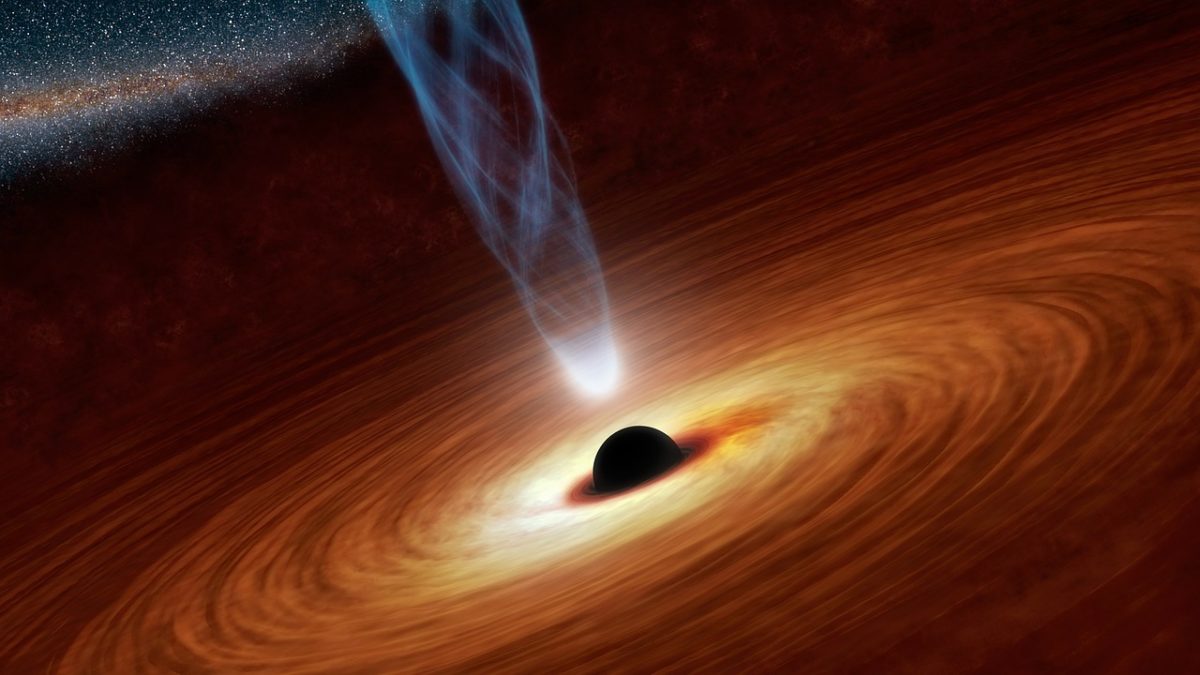A presentation of Hooke’s 1674 monograph introducing the idea of universal gravity was included in the Philosophical Transactions (Royal Society 1775) and subsequently several letters containing observations, including one of Huygens. But obviously, after the publication of Principia in 1687, Hooke’s priority in proposing universal gravitation was forgotten. Hooke, considered as a “mechanical genius” rather than a scientist, was often at a social disadvantage to Newton, the noble theorist, or Huygens. Hooke’s inferior social status did not allow him to identify with “free and unconfin’d” gentlemen such as Boyle, for example.
DOI: 10.13140/RG.2.2.13746.45763
Category: Physics
Isaac Newton vs. Robert Hooke on the law of universal gravitation
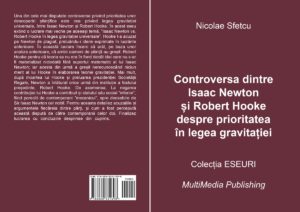 One of the most disputed controversy over the priority of scientific discoveries is that of the law of universal gravitation, between Isaac Newton and Robert Hooke. Hooke accused Newton of plagiarism, of taking over his ideas expressed in previous works. In this paper I try to show, on the basis of previous analysis, that both scientists were wrong: Robert Hooke because his theory was basically only ideas that would never have materialized without Isaac Newton’s mathematical support; and the latter was wrong by not recognizing Hooke’s ideas in drawing up the theory of gravity. Moreover, after Hooke’s death and taking over the Royal Society presidency, Newton removed from the institution any trace of the former president Robert Hooke. For this, I detail the accusations and arguments of each of the parts, and how this dispute was perceived by the contemporaries of the two scientists. I finish the paper with the conclusions drawn from the contents.
One of the most disputed controversy over the priority of scientific discoveries is that of the law of universal gravitation, between Isaac Newton and Robert Hooke. Hooke accused Newton of plagiarism, of taking over his ideas expressed in previous works. In this paper I try to show, on the basis of previous analysis, that both scientists were wrong: Robert Hooke because his theory was basically only ideas that would never have materialized without Isaac Newton’s mathematical support; and the latter was wrong by not recognizing Hooke’s ideas in drawing up the theory of gravity. Moreover, after Hooke’s death and taking over the Royal Society presidency, Newton removed from the institution any trace of the former president Robert Hooke. For this, I detail the accusations and arguments of each of the parts, and how this dispute was perceived by the contemporaries of the two scientists. I finish the paper with the conclusions drawn from the contents.
Keywords: Isaac Newton, Robert Hooke, law of gravity, priority, plagiarism
CONTENTS
Abstract
Introduction
Robert Hooke’s contribution to the law of universal gravitation
Isaac Newton’s contribution to the law of universal gravitation
Robert Hooke’s claim of his priority on the law of universal gravitation
Newton’s defense
The controversy in the opinion of other contemporary scientists
What the supporters of Isaac Newton say
What the supporters of Robert Hooke say
Conclusions
Bibliography
14.01.2019
DOI: 10.13140/RG.2.2.19370.26567
MultiMedia Publishing EPUB (ISBN 978-606-033-206-0), Kindle (ISBN 978-606-033-205-3), PDF (ISBN 978-606-033-204-6) https://www.telework.ro/en/e-books/isaac-newton-vs-robert-hooke-on-the-law-of-universal-gravitation/
Isaac Newton vs. Robert Hooke on the law of universal gravitation
About God in Newton’s correspondence with Richard Bentley and Queries in Opticks
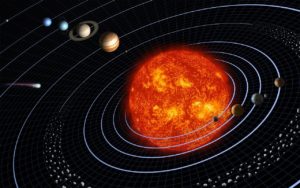 In Newton’s correspondence with Richard Bentley, Newton rejected the possibility of remote action, even though he accepted it in the Principia. Practically, Newton’s natural philosophy is indissolubly linked to his conception of God. The knowledge of God seems to be essentially immutable, unlike the laws of nature that can be subjected to refining, revision and rejection procedures. As Newton later states in Opticks, the cause of gravity is an active principle in matter, but this active principle is not an essential aspect of matter, but something that must have been added to matter by God, arguing in the same Query of Opticks even the need for divine intervention.
In Newton’s correspondence with Richard Bentley, Newton rejected the possibility of remote action, even though he accepted it in the Principia. Practically, Newton’s natural philosophy is indissolubly linked to his conception of God. The knowledge of God seems to be essentially immutable, unlike the laws of nature that can be subjected to refining, revision and rejection procedures. As Newton later states in Opticks, the cause of gravity is an active principle in matter, but this active principle is not an essential aspect of matter, but something that must have been added to matter by God, arguing in the same Query of Opticks even the need for divine intervention.
DOI: 10.13140/RG.2.2.16732.44162
About God in Newton’s correspondence with Richard Bentley and Queries in Opticks
Isaac Newton on the action at a distance in gravity: With or without God?
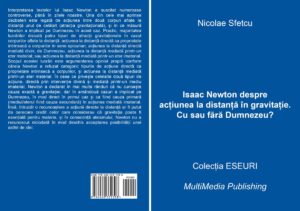 The interpretation of Isaac Newton’s texts has sparked controversy to this day. One of the most heated debates relates to the action between two bodies distant from each other (the gravitational attraction), and to what extent Newton involved God in this case. Practically, most of the papers discuss four types of gravitational attractions in the case of remote bodies: direct distance action as intrinsic property of bodies in epicurean sense; direct remote action divinely mediated by God; remote action mediated by a material ether; or remote action mediated by an immaterial ether. The purpose of this paper is to argue that Newton categorically rejected the types of direct action as the intrinsic property of bodies, and remote action mediated by a material ether. Concerning the other two types of action, direct through divine intervention and mediated through an immaterial environment, Newton has repeatedly stated that he does not know the exact cause of gravity, but in both cases, he has directly involved God, directly in the first case and as the primary cause (the environment/ether being the secondary cause) in immaterial mediated action. But since recognition of direct distance action could have given some credit to those who thought gravity could be essential to matter, and hence to atheism, Newton never openly acknowledged the possibility of such an idea.
The interpretation of Isaac Newton’s texts has sparked controversy to this day. One of the most heated debates relates to the action between two bodies distant from each other (the gravitational attraction), and to what extent Newton involved God in this case. Practically, most of the papers discuss four types of gravitational attractions in the case of remote bodies: direct distance action as intrinsic property of bodies in epicurean sense; direct remote action divinely mediated by God; remote action mediated by a material ether; or remote action mediated by an immaterial ether. The purpose of this paper is to argue that Newton categorically rejected the types of direct action as the intrinsic property of bodies, and remote action mediated by a material ether. Concerning the other two types of action, direct through divine intervention and mediated through an immaterial environment, Newton has repeatedly stated that he does not know the exact cause of gravity, but in both cases, he has directly involved God, directly in the first case and as the primary cause (the environment/ether being the secondary cause) in immaterial mediated action. But since recognition of direct distance action could have given some credit to those who thought gravity could be essential to matter, and hence to atheism, Newton never openly acknowledged the possibility of such an idea.
Keywords: Isaac Newton, action at a distance, God, gravity, gravity law, gravitation
CONTENTS
Abstract
Introduction
Principia
Correspondence with Richard Bentley
Queries in Opticks
Conclusions
Bibliography
DOI: 10.13140/RG.2.2.25823.92320
MultiMedia Publishing https://www.telework.ro/en/e-books/isaac-newton-on-the-action-at-a-distance-in-gravity-with-or-without-god/
Isaac Newton on the action at a distance in gravity: With or without God?
Causal Loops in Time Travel
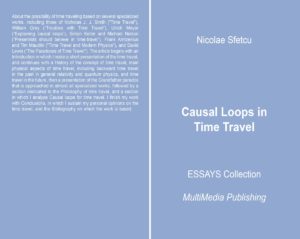 About the possibility of time traveling based on several specialized works, including those of Nicholas J. J. Smith (“Time Travel“), William Grey (”Troubles with Time Travel”), Ulrich Meyer (”Explaining causal loops”), Simon Keller and Michael Nelson (”Presentists should believe in time-travel”), Frank Arntzenius and Tim Maudlin (“Time Travel and Modern Physics“), and David Lewis (“The Paradoxes of Time Travel”). The article begins with an Introduction in which I make a short presentation of the time travel, and continues with a History of the concept of time travel, main physical aspects of time travel, including backward time travel in the past in general relativity and quantum physics, and time travel in the future, then a presentation of the Grandfather paradox that is approached in almost all specialized works, followed by a section dedicated to the Philosophy of time travel, and a section in which I analyze Causal loops for time travel. I finish my work with Conclusions, in which I sustain my personal opinions on the time travel, and the Bibliography on which the work is based.
About the possibility of time traveling based on several specialized works, including those of Nicholas J. J. Smith (“Time Travel“), William Grey (”Troubles with Time Travel”), Ulrich Meyer (”Explaining causal loops”), Simon Keller and Michael Nelson (”Presentists should believe in time-travel”), Frank Arntzenius and Tim Maudlin (“Time Travel and Modern Physics“), and David Lewis (“The Paradoxes of Time Travel”). The article begins with an Introduction in which I make a short presentation of the time travel, and continues with a History of the concept of time travel, main physical aspects of time travel, including backward time travel in the past in general relativity and quantum physics, and time travel in the future, then a presentation of the Grandfather paradox that is approached in almost all specialized works, followed by a section dedicated to the Philosophy of time travel, and a section in which I analyze Causal loops for time travel. I finish my work with Conclusions, in which I sustain my personal opinions on the time travel, and the Bibliography on which the work is based.
Keywords: time travel, grandfather paradox, causal loops, temporal paradoxes, causality
CONTENTS
Abstract
Introduction
History of the concept of time travel
Grandfather paradox
The philosophy of time travel
Causal loops
Conclusions
Bibliography
Notes
DOI: 10.13140/RG.2.2.17802.31680
MultiMedia Publishing: https://www.telework.ro/en/e-books/causal-loops-in-time-travel/
Newton’s Principia on God-mediated action
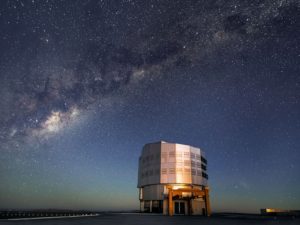 As John Henry states, Newton simply wants to reaffirm the truth of God’s omnipresence without directly involving him in the physics of the world system. Newton simply wants to distance himself from a Cartesian concept of God and convince the atheists that God is a real presence extended in the world. God must exist in space for the space to exist, but God does not only act through contact. Henry believes that Andrew Janiak and Hylarie Kochiras give us a wrong picture of a Newton who believes in opportunism. Newton, Henry asserts, has always assumed that God acted through secondary causes:
As John Henry states, Newton simply wants to reaffirm the truth of God’s omnipresence without directly involving him in the physics of the world system. Newton simply wants to distance himself from a Cartesian concept of God and convince the atheists that God is a real presence extended in the world. God must exist in space for the space to exist, but God does not only act through contact. Henry believes that Andrew Janiak and Hylarie Kochiras give us a wrong picture of a Newton who believes in opportunism. Newton, Henry asserts, has always assumed that God acted through secondary causes:
DOI: 10.13140/RG.2.2.35495.39846
The Ontology of General Relativity
General Relativity generated various early philosophical interpretations. His adherents have highlighted the “relativization of inertia” and the concept of simultaneity, Kantians and Neo-Kantians have underlined the approach of certain synthetic “intellectual forms” (especially the principle of general covariance, and logical empirics have emphasized the philosophical methodological significance of the theory.
Reichenbach approached the GR through the “relativity of geometry” thesis, trying to build a “constructive axiomatization” of relativity based on “elementary matters of fact” (Elementartatbestande) for the observable behavior of light rays, rods and clocks.
The mathematician Hermann Weyl attempted a reconstruction of Einstein’s theory based on the epistemology of a “pure infinitesimal geometry”, an extended geometry with additional terms that formally identified with the potential of the electromagnetic field.
DOI: 10.13140/RG.2.2.11641.93281
Space, time, and time travel
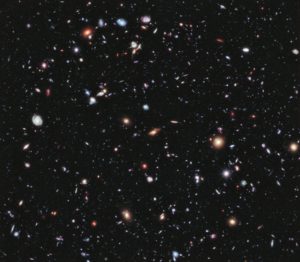 Newton supported the idea of absolute time, unlike Leibniz, for which time is only a relation between events and cannot be expressed independently, a statement in concordance with the relativity of space-time.
Newton supported the idea of absolute time, unlike Leibniz, for which time is only a relation between events and cannot be expressed independently, a statement in concordance with the relativity of space-time.
Eternalism claims that the past and the future exist in a real sense, going to the idea that time is a dimension similar to spatial dimensions, that future and past events are “present” on the axis of time, but this view is challenged. On four-dimensional vision, the universe is an existing space-time topology, containing everything that has happened, everything that happens and everything that’s going to happen. It follows that there is no singular moment to be considered as insignificant as present. Time travel is possible if the four-dimensional vision including the time is correct, but it is not possible if presentism is true. William Godfrey-Smith says that “the metaphysical image underlying the discussion of time travel is that of the universe block, in which the world is conceived as extended in time as it is in space.”
DOI: 10.13140/RG.2.2.18575.64163
Grandfather paradox in time travel
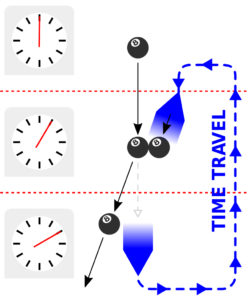 The most well-known example of the impossibility of traveling in time is the grandfather paradox or self-infanticide argument: a person who travels in the past and kills his own grandfather, thus preventing the existence of one of his parents and thus his own existence. A philosophical response to this paradox would be the impossibility of changing the past, like Novikov self-consistency principle (if an event exists that would cause a paradox or any “change” to the past whatsoever, then the probability of that event is zero, thus it would be impossible to create time paradoxes).
The most well-known example of the impossibility of traveling in time is the grandfather paradox or self-infanticide argument: a person who travels in the past and kills his own grandfather, thus preventing the existence of one of his parents and thus his own existence. A philosophical response to this paradox would be the impossibility of changing the past, like Novikov self-consistency principle (if an event exists that would cause a paradox or any “change” to the past whatsoever, then the probability of that event is zero, thus it would be impossible to create time paradoxes).
DOI: 10.13140/RG.2.2.31279.79521
Classical theory of singularities
 The singularities from the general relativity resulting by solving Einstein’s equations were and still are the subject of many scientific debates: Are there singularities in spacetime, or not? Big Bang was an initial singularity? If singularities exist, what is their ontology? Is the general theory of relativity a theory that has shown its limits in this case?
The singularities from the general relativity resulting by solving Einstein’s equations were and still are the subject of many scientific debates: Are there singularities in spacetime, or not? Big Bang was an initial singularity? If singularities exist, what is their ontology? Is the general theory of relativity a theory that has shown its limits in this case?
DOI: 10.13140/RG.2.2.22006.45124


